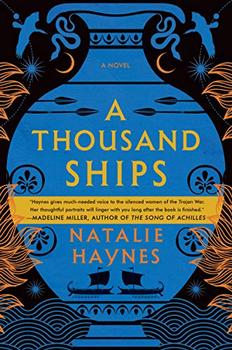Summary | Excerpt | Reviews | Beyond the Book | Readalikes | Genres & Themes | Author Bio

It was the largest sacrificial offering any of them had ever seen, even those Trojan men who had sailed abroad to Greece before the war. It was another way in which the Greeks sought to distinguish themselves. Their offerings to the gods were extravagant beyond measure. Why offer one cow when you could offer a hecatomb? The smell of burning meat from outside the walls had filled Troy in the early days of the war, when Creusa had eaten nothing but a small cup of barley with a little milk. The Greeks were doing it on purpose, she knew: flaunting their carcasses in front of a besieged city. But it would take more than hunger to break Trojan spirits. And as the war dragged from one year to the next, she thought the Greeks must regret their earlier largesse to the gods. If they had only saved some of those cattle, they might have had quite the herd by now, grazing on the sea-grass perhaps, and sustaining the soldiers who grew leaner every year.
But this offering was so large that it tricked the eyes. Creusa looked away for a moment and was shocked anew when she turned them back to its huge wooden planks. It towered above them, three or four times the height of a man. And though the design was rudimentary – what else could you expect from Greeks? – the figure was perfectly identifiable as a horse: four legs and a long grassy tail; a muzzle, though it lacked a mane. The wood had been cut with a clumsy axe, but the panels had been nailed together neatly enough. Ribbons had been tied around its brow to convey its sacrificial status.
'Have you ever seen anything like it?' she breathed to her husband. He shook his head. Of course not.
The Trojans approached the horse warily, as though it might come to life and snap its teeth. Foolish to be fearful of a simulacrum, but how could this be all that was left behind by an invading army? The men began to discuss what should be done, and their women stood back, murmuring to one another about the strange beast. Perhaps they should draw long grasses and twigs into a pile beneath the creature's feet, and burn it? If it was an offering to a god for a fair wind back to Greece – as seemed likely, though Creusa had heard of them making uglier sacrifices in the past – then could the Trojans inflict one last blow on their enemies by destroying it? Would that divert the good will of the god away from the Greeks? Or should they take the horse and dedicate it to the gods for themselves?
What began as a whispered conversation soon developed into shouts. Men who had fought alongside one another, brothers in arms and blood, were snarling at their kinsmen. The horse must be burned or saved; driven into the sea or dragged up to the city.
Creusa wished she could simply call for silence so she could sit on the dunes and lie back, stretching out her arms and legs, feeling the sand on her skin. It had been so long since she had been free. What did the Greeks' offerings matter to the Trojans now? She grabbed Euryleon's hand, and scooped him close to her legs as Aeneas stepped forward, squeezing Creusa's arm as he walked away. He did not want to be drawn into an argument, but he could not shirk his duty as one of Troy's defenders. The men had experienced a very different war from the women who waited for them, nursed them and fed them at the end of each day. To Aeneas, Creusa realized, the place where she now stood – from which she wished the Trojans would disappear so she could enjoy it in peace with her husband and her son – was still a battlefield.
Suddenly, the clamour fell silent and a shuffling figure made his painful way past Creusa, his dark red robes tangling around his gnarled feet. Priam walked like the old man he was, but he still held his head upright like a king. His proud queen, Hecabe, moved beside him into the centre of the crowd. She would not hold herself back, as the other women did.
'Enough!' Priam said, his voice quavering a little. Euryleon began to tug at Creusa's dress, wanting her attention for something he had seen – a beetle digging its laborious way through the sand-dune at their feet – but she shushed him. Nothing about this first day outside the city was matching her imagination, which had brought light into her darker moments. She had yearned for the day to come when her son saw for the first time the animals which lived along the shore. And now she was quieting him, so the king could speak to his furious subjects.
Excerpted from A Thousand Ships by Natalie Haynes. Copyright © 2021 by Natalie Haynes. Excerpted by permission of Harper. All rights reserved. No part of this excerpt may be reproduced or reprinted without permission in writing from the publisher.
The moment we persuade a child, any child, to cross that threshold into a library, we've changed their lives ...
Click Here to find out who said this, as well as discovering other famous literary quotes!
Your guide toexceptional books
BookBrowse seeks out and recommends the best in contemporary fiction and nonfiction—books that not only engage and entertain but also deepen our understanding of ourselves and the world around us.